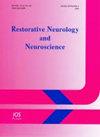热带地区可能的血管性痴呆:在科纳克里大学医院观察的二十六(26)项研究
IF 1.6
4区 医学
Q4 NEUROSCIENCES
引用次数: 0
摘要
导言:在热带环境中,由于医疗化程度低、咨询延误以及最重要的是探索方法的不足,血管性痴呆的诊断很难确定。材料和方法:我们分析了中心医院神经内科2016年1月1日至2021年12月21日期间因痴呆综合征住院的153例患者的记录。科纳克里大学。根据临床评估量表(ECD)评估痴呆状态,并通过迷你精神状态检查(MMSE<24)认知测试或神经、行为认知状态检查(NCSE)评分进行确认。结果:26(26)例患者符合DSM-IV血管性痴呆的标准,基于痴呆与脑血管疾病的关联,通过存在血管起源的局灶性神经学体征和影像学数据来证实。结论:这项研究显示了热带地区血管性痴呆频谱的非刻板临床和病因学概况,在医疗不足的背景下。这些结果对诊断和预后的讨论是有用的。本文章由计算机程序翻译,如有差异,请以英文原文为准。
Probable Vascular Dementia in the Tropics: A Study of Twenty-Six (26) Observations at Conakry University Hospital
Introduction: In tropical environments, the diagnostic certainty of vascular dementia is difficult to establish due to under-medicalization, delays in consultation and above all the inadequacy of exploration methods. Material and methods: We analyzed the records of 153 patients hospitalized for dementia syndrome over a period from January 1, 2016 to December 21, 2021 in the Neurology Department of the Centre Hospitalo-. Universitaire de Conakry. Dementia status was assessed according to the Clinical Evaluation Scale (ECD), Confirmed by Mini Mental State Examination (MMSE<24) cognitive tests or Neuro, behavioral Cognitive Status Examination (NCSE) score. Results: 26 (twenty-six) patients fulfilled the DSM-IV criteria for vascular dementia, based on the association of dementia and cerebrovascular disease certified by the presence of focal neurological signs of vascular origin and imaging data. Conclusion: this study shows a non-stereotyped clinical and etiological profile of the spectrum of vascular dementias in the tropics, in a context of under-medicalization. These results are useful for diagnostic and prognostic discussion.
求助全文
通过发布文献求助,成功后即可免费获取论文全文。
去求助
来源期刊
CiteScore
5.40
自引率
3.60%
发文量
22
审稿时长
>12 weeks
期刊介绍:
This interdisciplinary journal publishes papers relating to the plasticity and response of the nervous system to accidental or experimental injuries and their interventions, transplantation, neurodegenerative disorders and experimental strategies to improve regeneration or functional recovery and rehabilitation. Experimental and clinical research papers adopting fresh conceptual approaches are encouraged. The overriding criteria for publication are novelty, significant experimental or clinical relevance and interest to a multidisciplinary audience. Experiments on un-anesthetized animals should conform with the standards for the use of laboratory animals as established by the Institute of Laboratory Animal Resources, US National Academy of Sciences. Experiments in which paralytic agents are used must be justified. Patient identity should be concealed. All manuscripts are sent out for blind peer review to editorial board members or outside reviewers. Restorative Neurology and Neuroscience is a member of Neuroscience Peer Review Consortium.

 求助内容:
求助内容: 应助结果提醒方式:
应助结果提醒方式:


